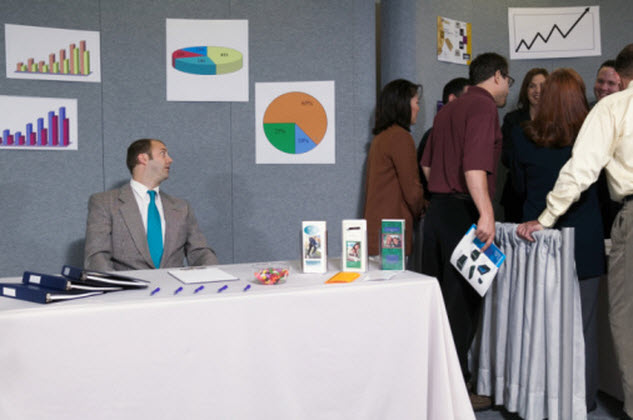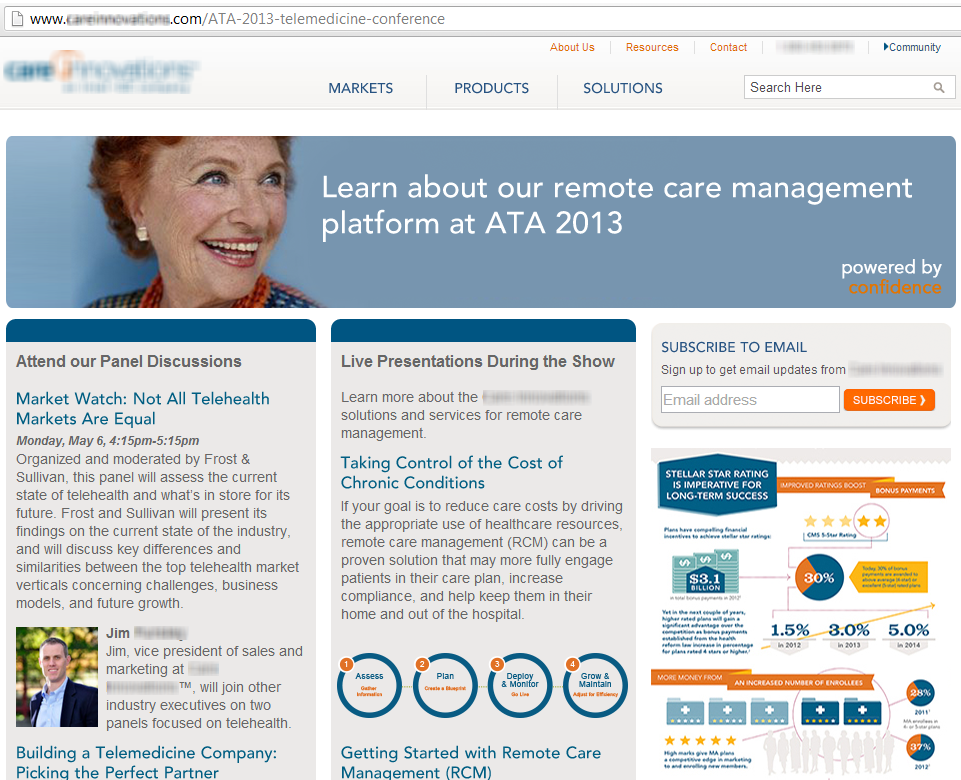Your company is staffing a booth at a trade show next quarter. From your experience last year, you know that many of the conference attendees are potential leads for you, yet the vast majority unfortunately simply pass your booth by, with only a few stopping to pick up information, let alone give you their valuable contact info. You have tried to improve your visibility, with an attractive space, valuable swag, one of your senior managers speaking at the conference, and your business listed among the event sponsors. But wouldn’t it be great to convert some of the traffic landing on the conference’s website into a greater number of attendees actually visiting your booth?
PPC (Pay-Per-Click. also known as SEM or Search Engine Marketing) advertisements are, in their typical form, the text ads that you see at the top or sides of the SERP (Search Engine Results Page) when performing a search on Google or other search engines. These ads are very effectively used to sell products and services via websites. However, more recently this advertising method has been used to promote an event or a company’s presence at an event.
Creating a PPC Campaign for Trade Shows and Events
Considering how this sort of campaign differs from an ordinary sales-driven campaign, here are some things to consider before engaging in a PPC bid campaign for the event.
Goal of PPC for Trade Shows is Brand Awareness:
Create your campaign with the trade show or conference in mind. A PPC campaign for a trade show will likely be significantly different than one created for a product: the goal here is brand awareness, so clicks often become secondary in focus. Your tradeshow campaign is about reaching as many viewers as possible, oftentimes more so than about getting clicks. The goal is to make a connection between your firm’s brand name and the conference. Therefore, the campaign is helpful even if there are no actual clicks to the ad. In fact, the fewer clicks, the less you pay. Impressions are gold!
Location Targeting for Tradeshow SEM
Administer your campaign settings so that you target the area where attendees might come from. Target areas of the country or world where people might have an interest in the specific trade show or event. If international, utilize AdWords’ new Location Bid Modifier feature and be alert for ESL speakers clicking your ads when they are really looking for something different.
Trade Show PPC Keywords
Determine the keywords that any potential visitor to the conference or event might type in. Make list of all potentially relevant trade shows(whether you will be present at them or not), all potential keywords for them, and any important negative keywords. Examples of negative keywords might be volunteer, employment, jobs, etc
The best keywords are those that are branded for the event: the name(“Associated Micro-Manufacturers Conference”), variations on that name(“AMMC”, “AMC”, “Micro Manu conference”), the URL(s) for the event, location, date and any mispellings are all great keywords to consider. Long-tail keywords related to the event can ensure that your message gets across to your target audience, which, in turn, can keep down CPC(Cost-Per-Click) rates. Balancing good keywords with relevant ad copy will help lower your CPC as well. Negative keywords of any similar events(“American Magic Makers Conference”) is important to keep costs down.
Landing Page Essentials
Ensure that your landing page encourages ad clickers to locate your booth at the conference to generate face-time and hopefully sales. The tailored landing page should mentions the trade show, where the booth will be situated, and any other important information to help your audience find you at the actual event. This synergy between the target keywords, ad copy and landing page, is critical for high Quality Scores, low CPC’s and better conversions. Include a strong call to action on the page to give your users a compelling reason to find you at the event. Contests, discounts, give-aways, etc are ways to entice people to visit your booth.
Converting PPC Event Traffic
While the primary goal of the PPC campaign is likely simply brand awareness, offering a clear, attractive CTA (Call-To-Action) on the event landing page can help you extract the most value from the campaign. Some of the ad clickers are likely to be interested in your product/services. Try to capture their contact info to build a valuable list of prospective leads. Common ways to do this include exchanging a white paper, entry to a contest or a handy guide to the event for the visitor’s email. At a bare minimum, offering a newsletter signup is a great way to collect email addresses. Whatever is offered, it should be tailored to event attendees.
Display, Social and Remarketing
While PPC Search ads are the most well-known form of Pay-Per-Click, Google and certain other ad retailers offer an different ad platform called “Display” that inserts text and image ads on large numbers of websites. These ads typically do not cost as much, or convert as effectively, as Search ads, and they are also often difficult to regionally-target. However, these ads can be very powerful if you can only show them on industry-related websites. Imagine a door manufacturer advertising their participation at a door and window conference, on door-related websites. Even if there are no ad clicks, the resultant brand awareness could be invaluable.
Remarketing PPC campaigns, only possible using Display ads on websites, can be quite effective for bringing leads back to your site. If the majority of visitors to the event are potential customers, and your products/services have a lengthy purchase cycle, it makes sense to now and then remind potential leads of your brand.
Social advertising uses Facebook and sometimes LinkedIn to drive engagement on social platforms. Results are often similar Display campaigns in costs and results. Assuming your firm has a strong social media plan and wants to increase participation, buying ads on social networks for an event can create dramatic engagement.
Timing the PPC Event Bidding
How long to advertise an SEM campaign targeted at an annual event would seem obvious – most marketers begin about a month and finish up around two weeks after. However, a strong case can be made that once-a-year-repeating events should be advertised on all year-round, as web analytics data from trade show websites suggest that event attendees visit conference websites for months before the event, and return sometimes long after, in order to review the event info. Considering the usually high value of attendees to industry events as potential leads, oftentimes it is worth spending for the chance to conflate the company brand with the event name several times, as well as naturally for the chance to gather more leads’ contact info over the longest period.
Key Follow-up Activities after Creating Conference PPC Campaign
- Contact event attendees immediately while they are present at the trade show. Offer rewards such as swag, exclusive tickets, or deep discounts, for the chance to discuss their needs regarding your products/services.
- Update all event-themed landing page(s) to reflect next year’s program.
- Monitor and adjust campaigns for any similar trade shows. For example, bidding on the keyword “2013 ata conference” would result in your ads showing for the 2013 American Telemedicine conference (5-7 May, Austin Texas) but also probably would show the ads for the 2013 American Translators Association conference (6-9 Nov, San Antonio Texas). Appropriate negative keywords and other precautionary measures should be used to screen out irrelevant traffic.
Example of PPC Event Campaign
A large telemedicine manufacturer wanted to promote their booth and presenters at a conference in early 2013. The company set up a landing page for the event, that was not accessible to regular visitors to the site:
This landing page contained both
- Interesting, engaging content that delivered value, in exchange for contact info, to trade show attendees who clicked the ads.
- Good SEO basics: Well-tailored URL and use of keywords throughout the body copy. Beyond the possibility of organic traffic, optimized landing pages like this help ensure good ad placement in the SERPs, high quality scores and lowest CPCs.
Ads were designed to promote the firm’s speakers at the event, as well as the company brand, in conjunction with the conference, but most importantly, the ads prominently advertised the company’s booth as one worth finding.
The result of this campaign was over 300 unique clicks, collection of 62 attendee emails and at least 14 booth visitors attributable directly to the campaign. Booth visits overall were up 15% from the previous (non-PPC advertised) year. This represents a several thousand percent ROI, considering it cost of under $3000. The campaign was turned off a few weeks after the event due to budget restraints, but traffic data to the website indicates 2-5 clicks would likely be acquired per month, if turned back on.
Trade Show PPC: An Effective Way to Advertise
Using PPC ads on industry events such as conferences can be a highly effective way to build brand awareness and contribute to success at the event. PPC campaigns for trade shows are most effectively used to generate brand awareness and entice attendees to visit your firm’s booth. Leveraging the right keywords, targeted ad copy and landing page can generate valuable buzz for the event and ongoing throughout the year.
Resources
http://searchengineland.com/how-to-maximize-your-trade-show-investment-via-search-marketing-28385
http://www.iprospect.com/blog/ppc/ppc-event-campaign-best-practices.html
http://www.ppchero.com/3-strategies-for-building-buzz-ahead-of-a-trade-show/




